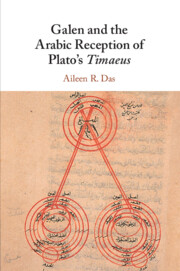Book contents
- Galen and the Arabic Reception of Plato’s Timaeus
- Galen and the Arabic Reception of Plato’s Timaeus
- Copyright page
- Dedication
- Contents
- List of Figures
- Acknowledgements
- Notes on Texts, Translations, and Transliterations
- Abbreviations
- Introduction: Plato’s Timaeus as Universal Text
- Chapter 1 Galen and the ‘Medical’ Timaeus
- Chapter 2 From the Heavens to the Body: Ḥunayn’s Ophthalmology
- Chapter 3 Al-Rāzī: The ‘Arab Galen’ and his Plato, New Disciplinary Ideals
- Chapter 4 Laying Down the Law: Avicenna and his Medical Project
- Chapter 5 Uprooting the Timaeus: Maimonides and the Re-medicalization of Galenism
- Conclusion: Medicine Disciplined
- References
- Index Locorum
- General Index
Conclusion: Medicine Disciplined
Published online by Cambridge University Press: 30 October 2020
- Galen and the Arabic Reception of Plato’s Timaeus
- Galen and the Arabic Reception of Plato’s Timaeus
- Copyright page
- Dedication
- Contents
- List of Figures
- Acknowledgements
- Notes on Texts, Translations, and Transliterations
- Abbreviations
- Introduction: Plato’s Timaeus as Universal Text
- Chapter 1 Galen and the ‘Medical’ Timaeus
- Chapter 2 From the Heavens to the Body: Ḥunayn’s Ophthalmology
- Chapter 3 Al-Rāzī: The ‘Arab Galen’ and his Plato, New Disciplinary Ideals
- Chapter 4 Laying Down the Law: Avicenna and his Medical Project
- Chapter 5 Uprooting the Timaeus: Maimonides and the Re-medicalization of Galenism
- Conclusion: Medicine Disciplined
- References
- Index Locorum
- General Index
Summary
Reflecting on the subjects from Plato's Timaeus at the centre of the disciplinary rivalry explored in the preceding chapters, I conclude that mind-body problems -- questions treating the extent to which psychic and 'mental' processes are separable from the corporeal realm -- provoked the most debate. My contention is that Galen's interpretation of a close link between the body and soul in the dialogue allowed himself and his sympathizers to give doctors a stake in psychological knowledge and trouble the distribution of value based on the corporeal-incorporeal dichotomy, which privileged philosophers. Therefore, the restrictive disciplinary laws imposed on doctors by Avicenna and Maimonides are a strategy to reclaim philosophy's hegemony on the soul and superior epistemic standing. While my study had divided Galen's successors into supporters and opponents of his project, I maintain that each Arabic actor tries to overwrite Galen's expertise with their own. Finally, I consider how my examination of the discursive reimagining of medicine can provide a longue durée perspective on modern reconceptualizations of the field, such as disputes about the relevance of the Medical Humanities.
- Type
- Chapter
- Information
- Galen and the Arabic Reception of Plato's Timaeus , pp. 198 - 203Publisher: Cambridge University PressPrint publication year: 2020

